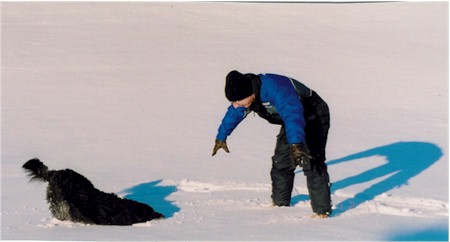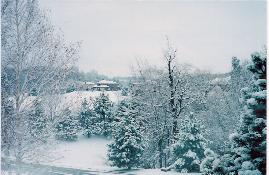 We live in something called an exurb: neither rural nor urban, nor suburban. It’s a hilly subdivision with 24 houses, each on roughly 2-acre lots abutting an 1100 acre semi-wilderness “conservation area”, with mostly farmland and forest on the other three sides. It’s nevertheless only 40 minutes (if you avoid rush hour) from the centre of Toronto. The whole area is protected from future development, since the Oak Ridges Moraine on which we sit is an essential source of both oxygen and groundwater for the six million people that live in the metropolitan area to the South. It’s a sanctuary from the noise, pollution and crowding of the city – one of our neighbours even has The Oasis hand-painted on their mailbox. Perhaps due to its isolation, it’s a remarkable community: everyone knows everyone else, neighbourhood parties and spontaneous get-togethers are commonplace, and we all look out for each other. Never in my life have I lived anywhere where I consider so many of my neighbours to be good friends. We live in something called an exurb: neither rural nor urban, nor suburban. It’s a hilly subdivision with 24 houses, each on roughly 2-acre lots abutting an 1100 acre semi-wilderness “conservation area”, with mostly farmland and forest on the other three sides. It’s nevertheless only 40 minutes (if you avoid rush hour) from the centre of Toronto. The whole area is protected from future development, since the Oak Ridges Moraine on which we sit is an essential source of both oxygen and groundwater for the six million people that live in the metropolitan area to the South. It’s a sanctuary from the noise, pollution and crowding of the city – one of our neighbours even has The Oasis hand-painted on their mailbox. Perhaps due to its isolation, it’s a remarkable community: everyone knows everyone else, neighbourhood parties and spontaneous get-togethers are commonplace, and we all look out for each other. Never in my life have I lived anywhere where I consider so many of my neighbours to be good friends.
In the evenings, our pound-rescue dog Chelsea alerts us when it’s time for the ritual after-dinner walk. Although it’s only a mile around the entire neighbourhood (the street circles back on itself), it can take as long as two hours. This is partly due to Chelsea’s suffering from both hypothyroid and arthritis, but is mainly due to long and serendipitous stops to visit both human and canine friends. After the evening walk, and after the mandatory affectionate and ecstatic dog-greetings back at home for whoever happens to be there, Chelsea immediately goes back outside, and sits on the back hill, the highest and quietest place on our property. Sometimes, like tonight, I go with her. In summer evenings the air is full of at least a dozen types of bird-song, the alliteration of the last of the Spring Peeper frogs and the first of the bullfrogs, as well as the sounds of crickets and bees and the drumming of woodpeckers. In the winter, however, it is astonishingly quiet, and on this night Chelsea and I sit in silence listening to the wind, and the occasional train far to the South, and wait. Soon there is a bark, coming from far away to the West, one of the farm dogs, possibly Sally the golden retriever who often joins our longer weekend walks up along the Bruce Trail, and drops off when we get to her favourite swimming pond. Then, after a pause, Rusty, who lives eight houses South, chimes in. Soon after from the East, tiny Rocky, blind but still passionate about his daily walks, pipes up. Emmy, the mischievous Yorkie escape artist who lives across the street, barks her high-pitched response, probably from her second-story balcony. Chelsea becomes the fifth dog to join the conversation, followed by Duke’s forlorn and mournful wail. I have learned these things from Chelsea and her canine colleagues, and from observing and studying geese (not at all deserving of the adjective ‘silly’), beavers and ravens, all of which are plentiful in our neighbourhood:
Fellow Slogger tribesmen, may your howling into the blogosphere always elicit a chorus of friendly, informed and polite replies, may your senses always be open to the magic of the world around you, real and virtual, and may your ‘place’ be full of love and learning. |
Navigation
Collapsniks
Albert Bates (US)
Andrew Nikiforuk (CA)
Brutus (US)
Carolyn Baker (US)*
Catherine Ingram (US)
Chris Hedges (US)
Dahr Jamail (US)
Dean Spillane-Walker (US)*
Derrick Jensen (US)
Dougald & Paul (IE/SE)*
Erik Michaels (US)
Gail Tverberg (US)
Guy McPherson (US)
Honest Sorcerer
Janaia & Robin (US)*
Jem Bendell (UK)
Mari Werner
Michael Dowd (US)*
Nate Hagens (US)
Paul Heft (US)*
Post Carbon Inst. (US)
Resilience (US)
Richard Heinberg (US)
Robert Jensen (US)
Roy Scranton (US)
Sam Mitchell (US)
Tim Morgan (UK)
Tim Watkins (UK)
Umair Haque (UK)
William Rees (CA)
XrayMike (AU)
Radical Non-Duality
Tony Parsons
Jim Newman
Tim Cliss
Andreas Müller
Kenneth Madden
Emerson Lim
Nancy Neithercut
Rosemarijn Roes
Frank McCaughey
Clare Cherikoff
Ere Parek, Izzy Cloke, Zabi AmaniEssential Reading
Archive by Category
My Bio, Contact Info, Signature Posts
About the Author (2023)
My Circles
E-mail me
--- My Best 200 Posts, 2003-22 by category, from newest to oldest ---
Collapse Watch:
Hope — On the Balance of Probabilities
The Caste War for the Dregs
Recuperation, Accommodation, Resilience
How Do We Teach the Critical Skills
Collapse Not Apocalypse
Effective Activism
'Making Sense of the World' Reading List
Notes From the Rising Dark
What is Exponential Decay
Collapse: Slowly Then Suddenly
Slouching Towards Bethlehem
Making Sense of Who We Are
What Would Net-Zero Emissions Look Like?
Post Collapse with Michael Dowd (video)
Why Economic Collapse Will Precede Climate Collapse
Being Adaptable: A Reminder List
A Culture of Fear
What Will It Take?
A Future Without Us
Dean Walker Interview (video)
The Mushroom at the End of the World
What Would It Take To Live Sustainably?
The New Political Map (Poster)
Beyond Belief
Complexity and Collapse
Requiem for a Species
Civilization Disease
What a Desolated Earth Looks Like
If We Had a Better Story...
Giving Up on Environmentalism
The Hard Part is Finding People Who Care
Going Vegan
The Dark & Gathering Sameness of the World
The End of Philosophy
A Short History of Progress
The Boiling Frog
Our Culture / Ourselves:
A CoVid-19 Recap
What It Means to be Human
A Culture Built on Wrong Models
Understanding Conservatives
Our Unique Capacity for Hatred
Not Meant to Govern Each Other
The Humanist Trap
Credulous
Amazing What People Get Used To
My Reluctant Misanthropy
The Dawn of Everything
Species Shame
Why Misinformation Doesn't Work
The Lab-Leak Hypothesis
The Right to Die
CoVid-19: Go for Zero
Pollard's Laws
On Caste
The Process of Self-Organization
The Tragic Spread of Misinformation
A Better Way to Work
The Needs of the Moment
Ask Yourself This
What to Believe Now?
Rogue Primate
Conversation & Silence
The Language of Our Eyes
True Story
May I Ask a Question?
Cultural Acedia: When We Can No Longer Care
Useless Advice
Several Short Sentences About Learning
Why I Don't Want to Hear Your Story
A Harvest of Myths
The Qualities of a Great Story
The Trouble With Stories
A Model of Identity & Community
Not Ready to Do What's Needed
A Culture of Dependence
So What's Next
Ten Things to Do When You're Feeling Hopeless
No Use to the World Broken
Living in Another World
Does Language Restrict What We Can Think?
The Value of Conversation Manifesto Nobody Knows Anything
If I Only Had 37 Days
The Only Life We Know
A Long Way Down
No Noble Savages
Figments of Reality
Too Far Ahead
Learning From Nature
The Rogue Animal
How the World Really Works:
Making Sense of Scents
An Age of Wonder
The Truth About Ukraine
Navigating Complexity
The Supply Chain Problem
The Promise of Dialogue
Too Dumb to Take Care of Ourselves
Extinction Capitalism
Homeless
Republicans Slide Into Fascism
All the Things I Was Wrong About
Several Short Sentences About Sharks
How Change Happens
What's the Best Possible Outcome?
The Perpetual Growth Machine
We Make Zero
How Long We've Been Around (graphic)
If You Wanted to Sabotage the Elections
Collective Intelligence & Complexity
Ten Things I Wish I'd Learned Earlier
The Problem With Systems
Against Hope (Video)
The Admission of Necessary Ignorance
Several Short Sentences About Jellyfish
Loren Eiseley, in Verse
A Synopsis of 'Finding the Sweet Spot'
Learning from Indigenous Cultures
The Gift Economy
The Job of the Media
The Wal-Mart Dilemma
The Illusion of the Separate Self, and Free Will:
No Free Will, No Freedom
The Other Side of 'No Me'
This Body Takes Me For a Walk
The Only One Who Really Knew Me
No Free Will — Fightin' Words
The Paradox of the Self
A Radical Non-Duality FAQ
What We Think We Know
Bark Bark Bark Bark Bark Bark Bark
Healing From Ourselves
The Entanglement Hypothesis
Nothing Needs to Happen
Nothing to Say About This
What I Wanted to Believe
A Continuous Reassemblage of Meaning
No Choice But to Misbehave
What's Apparently Happening
A Different Kind of Animal
Happy Now?
This Creature
Did Early Humans Have Selves?
Nothing On Offer Here
Even Simpler and More Hopeless Than That
Glimpses
How Our Bodies Sense the World
Fragments
What Happens in Vagus
We Have No Choice
Never Comfortable in the Skin of Self
Letting Go of the Story of Me
All There Is, Is This
A Theory of No Mind
Creative Works:
Mindful Wanderings (Reflections) (Archive)
A Prayer to No One
Frogs' Hollow (Short Story)
We Do What We Do (Poem)
Negative Assertions (Poem)
Reminder (Short Story)
A Canadian Sorry (Satire)
Under No Illusions (Short Story)
The Ever-Stranger (Poem)
The Fortune Teller (Short Story)
Non-Duality Dude (Play)
Your Self: An Owner's Manual (Satire)
All the Things I Thought I Knew (Short Story)
On the Shoulders of Giants (Short Story)
Improv (Poem)
Calling the Cage Freedom (Short Story)
Rune (Poem)
Only This (Poem)
The Other Extinction (Short Story)
Invisible (Poem)
Disruption (Short Story)
A Thought-Less Experiment (Poem)
Speaking Grosbeak (Short Story)
The Only Way There (Short Story)
The Wild Man (Short Story)
Flywheel (Short Story)
The Opposite of Presence (Satire)
How to Make Love Last (Poem)
The Horses' Bodies (Poem)
Enough (Lament)
Distracted (Short Story)
Worse, Still (Poem)
Conjurer (Satire)
A Conversation (Short Story)
Farewell to Albion (Poem)
My Other Sites






Feeling inspired, I see. A nice read, Dave. Regards, – R.
Thanks. I used to be very good at these kinds of stories, but after writing almost exclusively business papers and #%&%# powerpoint presentations, my creative prose has become very rusty. Still way too wordy, analogies forced, images vague, too many hackneyed adjectives, overlong sentences, etc…*sigh*. Well, thanks for the encouraging words. I take solace from reading the Friday Five lists, showing almost all bloggers’ #1 objective in blogging is to become better writers.